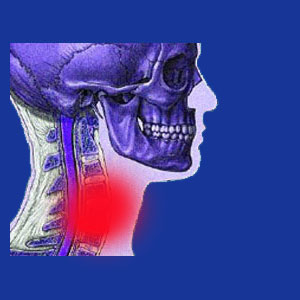
Globus sensation neck pain is just one of the possible expressions of chronic globus pharyngis conditions. This lump in the throat feeling ranges from annoying to debilitating and can easily become a primary symptom for many patients with severe expressions.
Globus is one of the least understood of all medical issues, since structural causation theories are unproven and often illogical. Meanwhile, while most physicians understand that there is usually a psychological cause of globus to exist, they do not know how to treat the condition except through drug therapies and surgical interventions. These therapies are classic examples of symptomatic treatment and usually result in poor outcomes or symptom substitution.
This guide examines globus sensation from a completely different and enlightened perspective. We will detail the possible causes of the throat and neck problem, the variety of possible symptoms experienced and the treatments that work best. If you are affected by a globus feeling in the throat, this is the only essay you will ever need in order to recover.
Globus Sensation Neck Pain Symptoms
Globus, also known as globus hystericus, globus pharyngis or globus sensation, is an umbrella name for a range of possible throat symptoms including a perceived lump, dryness, pain, tightness, cough, increased gag reflex and difficulty swallowing. Symptoms range from barely present to incredibly severe, with some people becoming desperate quite quickly due to truly debilitating throat issues.
The classic expression is the feeling of a mass in the throat, as if some object were stuck. However, in globus, there is no actual lump, but just the perception of an object stuck just behind the region of the larynx and thyroid gland, often located in the pit of the throat. Visualization of the throat, via various techniques, will show a clear passage, without mass or impediment. CT scan, MRI and ultrasound can also be used to visualize the region and ascertain whether any mass is indeed present to explain symptoms.
Patients often cite extreme tightness in the throat, including the esophagus and the surrounding musculature and cartilage. This tightness can increase gag reflex, often to very severe degrees. The tight feeling can also make it seem like swallowing may be difficult, although the vast majority of patients can indeed swallow perfectly normally and in fact, often find short-term relief when eating or drinking.
Many patients with lasting globus concerns develop chronic sore throats and this pain can radiate through the front and sides of the neck unilaterally or bilaterally.
Some patients also develop a cracking or crunching sound in the throat, especially upon swallowing or turning the head sharply.
It is rather common for patients with chronic globus sensation to also experience a dry cough, often exacerbated directly after particularly severe episodes of tightness and pain.
Regardless of the symptoms present, which may change often or progress, patients usually have varying degrees of discomfort day-to-day and typically experience worse expressions as the day goes on. Most report feeling better when falling asleep or actually sleeping, although this is not a universal finding.
Causes of Globus Sensation
Traditionally, the onset of globus is usually considered to be a purely psychologically-induced condition. In fact, the original name of the throat lump problem was globus hystericus, pointing to obvious psychogenic causation.
However, with the growing trend towards embracing a purely Cartesian medical model over the past 60 years, doctors have found globus sensation to be untreatable (and therefore, unprofitable) unless they can link it to some diagnosable anatomical condition. This led the way for the modern view of globus to be commonly associated with gastroesophageal reflux and laryngopharyngeal reflux conditons. GERD is an epidemic diagnosis at this stage of human history and is often blamed on structural defects in the stomach, esophagus and the sphincters that separate the two structures. Meanwhile, years back, virtually all gastrointestinal and digestive disorders were considered and treated as being of mindbody origin. This shift towards embracing structural causation for globus has resulted in more pain for patients, longer lasting symptoms and fewer answers about the best path for treatment.
Statistics are quite clear that globus has become a worse problem since doctors began to link it to GERD, gastritis and other GI disorders. All these digestive disorders also became more prevalent when the idea of stress causation began to fall out of favor and the idea of a mechanical model of symptom expression, based on structural dysfunction, became the norm.
In rare cases, globus might be related to a purely anatomical concern, such as in the case of Eagle syndrome, anterior cervical intervertebral herniation or hypertrophic cartilage problems in the throat. However, these represent less than 1% of globus sufferers.
In the vast majority of people, symptoms are blamed on some type of reflux, whether or not traditional GERD symptoms exist. When reflux does exist, it is often simply part of a larger mindbody process that is causing the dysfunction of the digestive tract, usually through muscular spasm initiated by autonomic nerve messaging from the subconscious brain. The common diagnosis of cricopharyngeal spasm is obviously a mindbody phenomenon, since it can be relieved temporarily by pharmaceutical products that work on the brain and nerves that are the root source of the throat symptoms.
Treatment for Globus Sensation Neck Pain
Decades ago in the distant past, there was often no treatment offered for globus sensation. Doctors knew that the condition was a mindbody issue and simply told the affected patient not to worry. The condition was harmless and the less they thought about it, the shorter it would endure. This approach worked almost universally, cementing the psychological cause of globus in clinical medical history.
Now, globus is managed with a range of drugs, usually acting on the gastrointestinal tract or the brain. Antacids are almost universally prescribed and other types of drugs often supplementing treatment include SSRI anti-depressants, anti-spasmodics, as well as some anti-psychotic substances. All of these pharmaceutical products are dangerous and have not been proven to successfully treat globus, although many of the SSRIs can assist in the repression process, reducing symptoms temporarily. However, this pharmaceutical smokescreen is risky, since symptoms can return once treatment is discontinued, or may be expressed as some other, and potentially worse, type of substitute condition.
Some patients undergo surgery, to tighten or loosen esophageal sphincters or to shave cartilage within the throat itself. A few patients undergo cervical spinal surgery to resolve anterior disc herniations thought to be involved in the expression. In 90% of these cases, symptoms never resolve, although they might improve temporarily due to placebo. Only a minority of postoperative patients find lasting relief, since only a small number are correctly diagnosed.
Dietary alteration and lifestyle modification are commonly recommended, even without any proof of efficacy. This might include not eating spicy foods or a wide range of foods, not eating before lying down, not smoking, not drinking alcohol, coffee and other beverages, and following strict and often illogical regimens that rarely prove effectual.
Globus Sensation Evaluation
Unless there is an obvious structural issue causing globus, we usually classify all cases, with or without additional stomach and esophageal symptoms, to be psychogenic and stress-related. Once the patient is made fully aware that there is no danger, although the symptoms are extreme uncomfortable, the condition will resolve organically. This is proof positive that globus is a mindbody pain syndrome, like so many other difficult-to-treat health issues that are mistakenly linked to various structural and mechanical anatomical irregularities.
I suffered from a four month bout of globus that began a few weeks after upper GI troubles, eventually diagnosed as gastritis. Gastroscopy, blood tests and a wide range of other diagnostic evaluations showed no structural issues, just general stomach inflammation. The symptoms were terrible, but at this stage I embrace the idea that unconscious repressed emotions were the true cause, especially since other theories proved to be ridiculous, and subsequent treatments were ineffective. In fact, I came to realize the existence of a great misdiagnosis problem in the medical sector as a whole, with doctors prescribing anti-acid drugs for countless millions of patients who actually suffer from low stomach acidity, instead of hyperacidity. This is a huge problem on an epic scale, but I digress from my original focus of globus pharyngis…
If you are suffering from globus, consider the most logical explanation to be the most valid in virtually every case. The problem is virtually always related to muscular spasms in the throat and may include the upper and lower esophageal sphincters, often creating GERD, gastritis and pre-ulcer conditions. This autonomic mischief is controlled by areas of the mind that also causes the full range of other psychogenic health issues, such as psychosomatic neck pain. There is little doubt that globus sensation represents just another possible expression that is designed to keep the tense mind focused on the body, so that it will not have to face the dangers lurking repressed in the subterranean levels of the unconscious. If you can understand and accept this explanation, your globus is sure to feel better and eventually resolve without risky drugs, surgery or other unenlightened treatments that pre-suppose a dietary, lifestyle or structural origin.
Neck Pain > Neck Pain Causes > Globus Sensation






